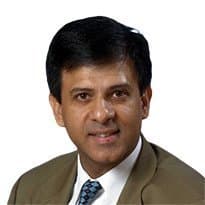Nagpaul backs ‘measured’ access approach
- 4 November 2013

A measured approach to providing online access to patient records is necessary to make sure that the GP profession is kept on board and information governance and security issues can be resolved, the BMA’s GP Committee chair has said.
The government has made a commitment that by March 2015, all patients will have secure online access to their GP record if they want it.
All practices must also make transactional services available online, such as booking appointments and ordering repeat prescriptions.
EHI revealed last week that the minimum that GPs must do by the target date is to provide online access to the same information as is held in the Summary Care Record.
NHS England will identify and evaluate a series of “accelerator sites” to build a case for providing full records access – which is still the ambition – and will release guidance in April 2014 for practices to make progress towards this goal.
Dr Chaand Nagpaul said he has worked closely with the NHS England on implementation of the government records access mandate.
"History has shown that IT initiatives that have been hasty and imposed without dialogue with the profession have run into problems; such as implementation of the Summary Care Record and Choose and Book," he said.
"We know that just rushing through and implementing IT policies without full consideration and without the profession coming on board is counter-productive, so I commend NHS England for taking this measured approach."
Dr Nagpaul described online access to patient records as "fiendishly complex". The government’s commissioned road map for achieving this, produced by the Royal College of GPs, highlights considerable risks and unintended consequences.
These include information governance issues and third party access to personal records.
There are also logistical issues to consider, as the GP profession is undergoing huge change and faces growing work pressures.
"The last thing we want is for this to become another initiative with unintended adverse consequences and be introduced in a way that is too rushed for the profession to take on board," Dr Nagpaul said.
He acknowledged that the idea of the first target simply being access to SCR information was a surprise for many, but argued that it is the "right thing to do for all the right reasons."
Dr Nagpaul could not say whether this would be broadly acceptable to GPs, but pointed out that what is held in the SCR is already defined and has previously been available for patients to access via the now defunct HealthSpace portal.
"There’s absolutely no benefit in introducing IT changes in a hasty manner without considering the full potential implications.
"Therefore, it’s right that NHS England should work with the royal college and the BMA. By 2015 patients will have online access to GP services, which is what the government said, and we will have introduced a pace of change that’s appropriate."
Dr Nagpaul said there needs to be a dialogue about what wider patient access is going to mean and work is ongoing to achieve this.
"It would be a pity if political expediency overrides what should be a sensible measured approach.
"We certainly support what [NHS England’s Patient Online programme lead Kathy Mason] has said [about the target] and hope NHS England will abide by that.
"Ultimately, this is about ensuring that the IT change is successful," he added.




